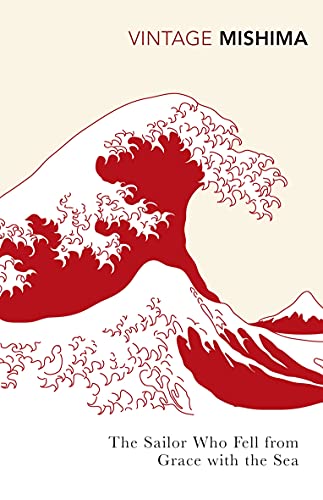
Ebook Info
- Published: 2010
- Number of pages: 145 pages
- Format: PDF
- File Size: 2.26 MB
- Authors: Yukio Mishima
Description
A band of savage thirteen-year-old boys reject the adult world as illusory, hypocritical, and sentimental, and train themselves in a brutal callousness they call ‘objectivity’. When the mother of one of them begins an affair with a ship’s officer, he and his friends idealise the man at first; but it is not long before they conclude that he is in fact soft and romantic. They regard this disallusionment as an act of betrayal on his part – and the retribution is deliberate and horrifying.
User’s Reviews
Reviews from Amazon users which were colected at the time this book was published on the website:
⭐In my Mishima binge it’s easy to adapt to the feeling that each chronologically subsequent novel will become my latest favorite. It’s another thing altogether to feel, upon reading The Sailor Who Fell From Grace With The Sea, that I’ve encountered my latest favorite, perfectly chiasmic novel of all.As much as I have come to appreciate with spontaneous astonishment the beauty and clarity of Mishima’s descriptions, their integrity and definitive distillation of scene and psyche, it is the mastery and inevitability of the multi-various strands of narrative, intuitive and meditative counterpoint resultant in a skein of delusion, greatness in escalating factors of consummate cruelty,, solidity and innate hatred of it, trust in and betrayal by the best expectations of youth and innocence.This ricercare is woven of the interior and exterior voices of 13-year old Noboru, Ryuji, the eponymous Sailor, and finally, although we have seen her since the earliest pages, have indeed seen her first night with Ryuji through Noboru’s Hitchcockean peephole into her room, Noboru’s single mother, Fusako is finally named and eventually given voice to her dreams, doubts and equivocations.The overarching superego is horrifically, tragically cast as a prepubescent Animal Farm-like cult of nihilist pre-Incels. As frightening is their leader’s, their disfigured Chief’s anarchist manifestoes can be in their occasionally compelling moments of manipulation, there is a rite of passage involving cruelty to a stray kitten that will not only preclude my recommending this book to any of my fellow cat-lovers, but even more horrifyingly, serves as a mere appetizer of things to come, inexorably, inevitably.
⭐The genius of Sailor is how it examines complex issues – Japan’s postwar identity, western materialism versus traditional Japanese values, the ways in which nihilism overwhelms meaning – in such a concise, straightforward story. Ryuji is a simple sailor who went to sea to achieve some vaguely defined higher glory. Although Ryuji believes he’s destined for great things, so far the fates haven’t aligned to reveal what that great thing is. While on shore leave in Yokohama he meets Fusako, a widow who owns a high end clothing store that offers imported English articles. They become lovers, and, before long, fall in love.Fusako’s thirteen year old son Noburu runs with a gang of strange and frightening youths who reject all attempts to impose meaning on them from the outside, whether it’s from school, parents, society or literature. Noburu is torn between loyalty to the beliefs of his gang and his admiration for the heroic life he believes Ryuji exemplifies. But Ryuji’s growing love for Fusako leads him to abandon the sea to become a clerk in Fusako’s shop. Noburu’s gang pounces on this as evidence that Ryuji has betrayed Noburu and them, and that he must be punished for abandoning the heroic course. This they proceed to do, in a way that feels both horrifying and inevitable.Written five years before his death at 45, this novel encapsulates Mishima’s major intellectual and emotional preoccupations, but doesn’t resolve them. Ryuji is punished for abandoning his dreams of glory, but it’s not clear he would have achieved them. Fusako symbolizes collaboration with the western devil taking over Japan, but she is accomplished and financially successful. The most disturbing character is young Noburu. At an age when most humans are acquiring the mental sextants they need to navigate through the world, he is ensnared by a group who see life as having meaning only in the extremes of glory or death. The growing distance between his everyday life and his dark fantasies opens up during the course of the novel in profound and unsettling ways. What happens to Noburu, who has his whole life in front of him, is in many ways sadder than what happens to Ryuji.Noburu’s dark dialectic is also a glimpse into the mental torments that affected Mishima. The most un-Japanese of its major writers in terms of his interests and lifestyle, he was nevertheless the most jingoistic Japanese patriot. A man of massive discipline and ambition, he was bedeviled by the fear that beneath the surface of his successful, glittering life lay a vast emptiness devoid of meaning. He spent his enormous intellectual and physical resources on turning himself into a symbol, but doubts about the meaning of that symbol led him to constantly revise it. Out of these internal contradictions he generated a furious literary output, a high profile life and a very public, if puzzling death meant to protest Japan’s turn away from its traditional values. His internal struggles were both sad and heroic; his legacy is the great novels he left us, including this one.
⭐Enjoyable novel and if you like any of Yukio Mishima’s other books or even just enjoy the premise, I promise you’ll enjoy it. Only thing is some of the content is heavy so be aware.
⭐There is so much in this book to not like. There are early disturbing parts that make you wonder what the heck you are reading and seemingly directionless storytelling.But, I stuck with it and in the last two chapters the book revealed it’s purpose to me and the ideas/insights it was leading me toward.I think that for someone who understood Japanese Culture, Honor, and Bushido it could easily be a lifetime favorite.For me as a westerner who only slightly knows about those things, some of it was lost on me. The idea of an Honorable death for example isn’t something western kids fantasize about.The most impactful part of this book was the circle of life between the Sailor and Boy, who are in some ways the same person at different ages.I would recommend this book to others, but with a warning: This won’t be like the books you’re used to reading.
⭐Yukio Mishima was a true master of confronting themes, written with great style. His descriptions of place are wonderful, plucking out one small pine bathed in sunlight in the midst of the desolation of an industrial landscape. You soon sense the underlying tension of this book – steadily emerging from the beauty, you know that this is going to end badly, with an unavoidable horror that is coming … Gripping stuff. Thankfully no splatter-fest – but the cold, sociopathic “chief” and his nihilistic accolytes are truly frightening. The inevitability of what will be done is left to haunt you.Sure, you can read it at a number of levels – a contemporary view of a post-war Japan, a treatise on charismatic but psychopathic leadership, whatever. Or maybe just take it as a beautifully written tale of suspense and horror. Either way, it is great literature.Not one for the faint hearted – the cold, hard suspense is difficult to bear.
⭐Amazing story, with a disturbing insight into Yukio Mishima’s mindset. His use of poetic language and his eloquence is astonishing being his only fictional piece. I recommend reading about the author before reading, as it will help you draw many parallels between the book and his mindset (encroaching westernisation on japan).4/5 typos which was a shame (random letters instead of full stops which really shows carelessness). If I could give separate scores I would rate the story 5 stars and give the transcription 3.
⭐I’m by no means in agreement with hardly anything that Yukio Mishima writes, however his descriptive power and the ways in which he uses surrounding environments to frame his messages is definitely something other authors could take note on.The story essentially plays out in the heads of the participants but for me the ways in which the trains of thought go, and the ultimate intentions behind their actions to me show the mental state of the author which rightly was worrying. (Look up his death, Mishima Jiken). To some it may read as an interpretation of a post war life of men in the face of a Nietzschean idea of being an ubermesnch. To me it reads as a fragile masculinity complex mixed in with the culture shocks Japan was experiencing since the Meiji Restoration, Mishima was looking for some sort of manly realisation in this world. A sad story and look into his mind albeit a very well written and executed one.
⭐After a wonderful 8 days on holiday in Tokyo. I needed something to read on the 12 hour flight home and thought it would be appropriate to try some Japanese literature. I was browsing on Amazon and this was one of the few titles I had heard of. I was pleasantly surprised , it was actually very good. The novel is short, evocative and very moving. A previous reviewer mentions “Lord of the Flies” and I can see why. I cannot speak for the accuracy of the translation, but the English language version reads very well. If , like me, you never read any Japanese literature, it seems a good place to start.
⭐This is one of those disturbing Japanese pieces of fiction which is difficult to read yet somehow you feel you have to! It’s a bleak tale of a young Japanese widow and her teenage son who get involved with a merchant navy officer who becomes the widow’s lover. She is an independent businesswoman, running her own high-end fashion shop for film stars and wealthy middle-class customers, yet she yearns for a man in her life and begins a relationship with the sailor, who is also a loner and not used to company. What enfolds is a horrifying conclusion to everyone’s dreams of happiness and fulfillment in life.
⭐Japanese literature is almost as individually indifferent as Japanese culture and life. Fascinating but unwelcome to foreigners which makes it all the more appealing. Tradition, honour and integrity within a racially unique back drop. Fascinating
Keywords
Free Download The Sailor who Fell from Grace with the Sea (Vintage Classics) in PDF format
The Sailor who Fell from Grace with the Sea (Vintage Classics) PDF Free Download
Download The Sailor who Fell from Grace with the Sea (Vintage Classics) 2010 PDF Free
The Sailor who Fell from Grace with the Sea (Vintage Classics) 2010 PDF Free Download
Download The Sailor who Fell from Grace with the Sea (Vintage Classics) PDF
Free Download Ebook The Sailor who Fell from Grace with the Sea (Vintage Classics)




